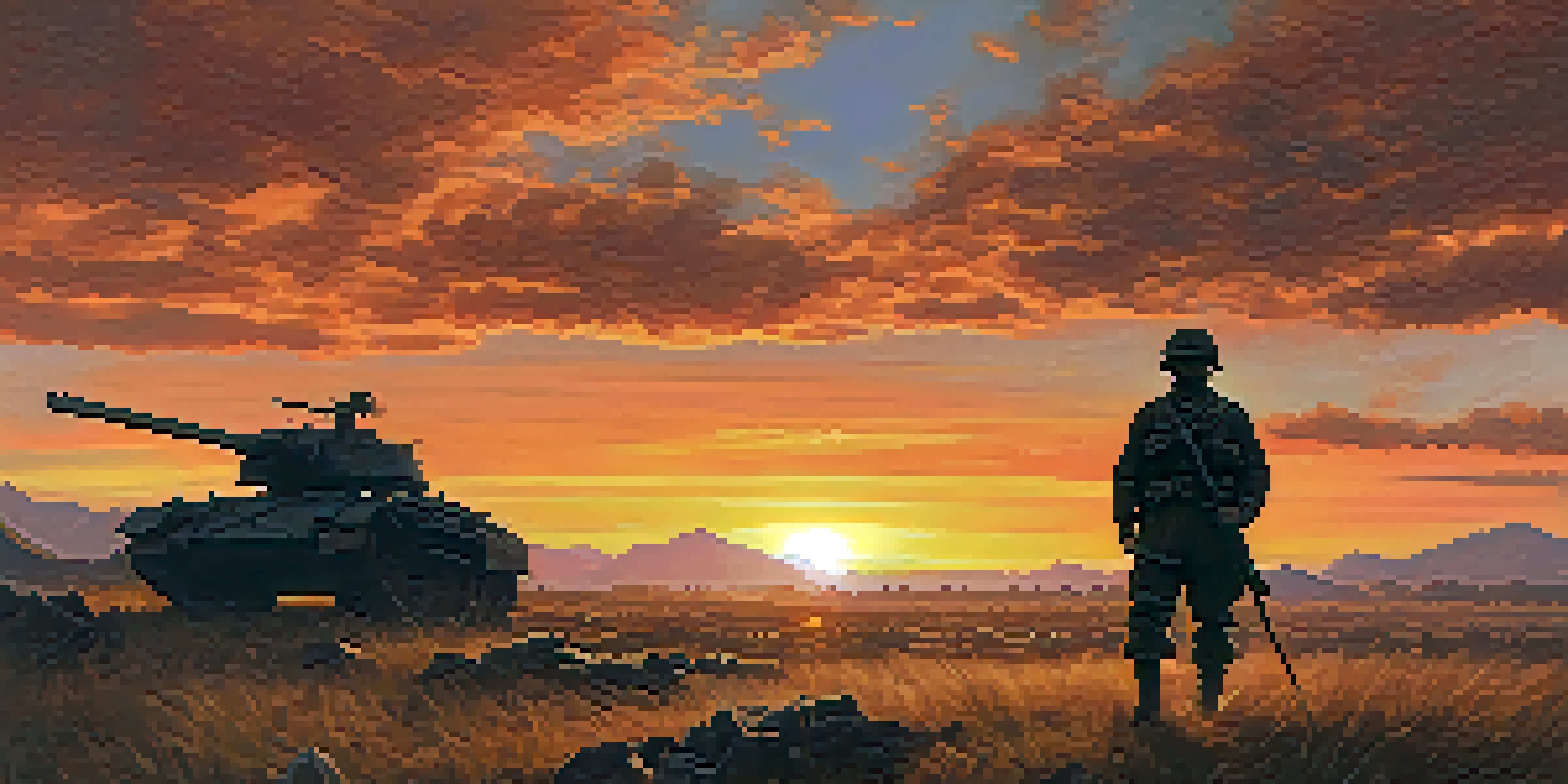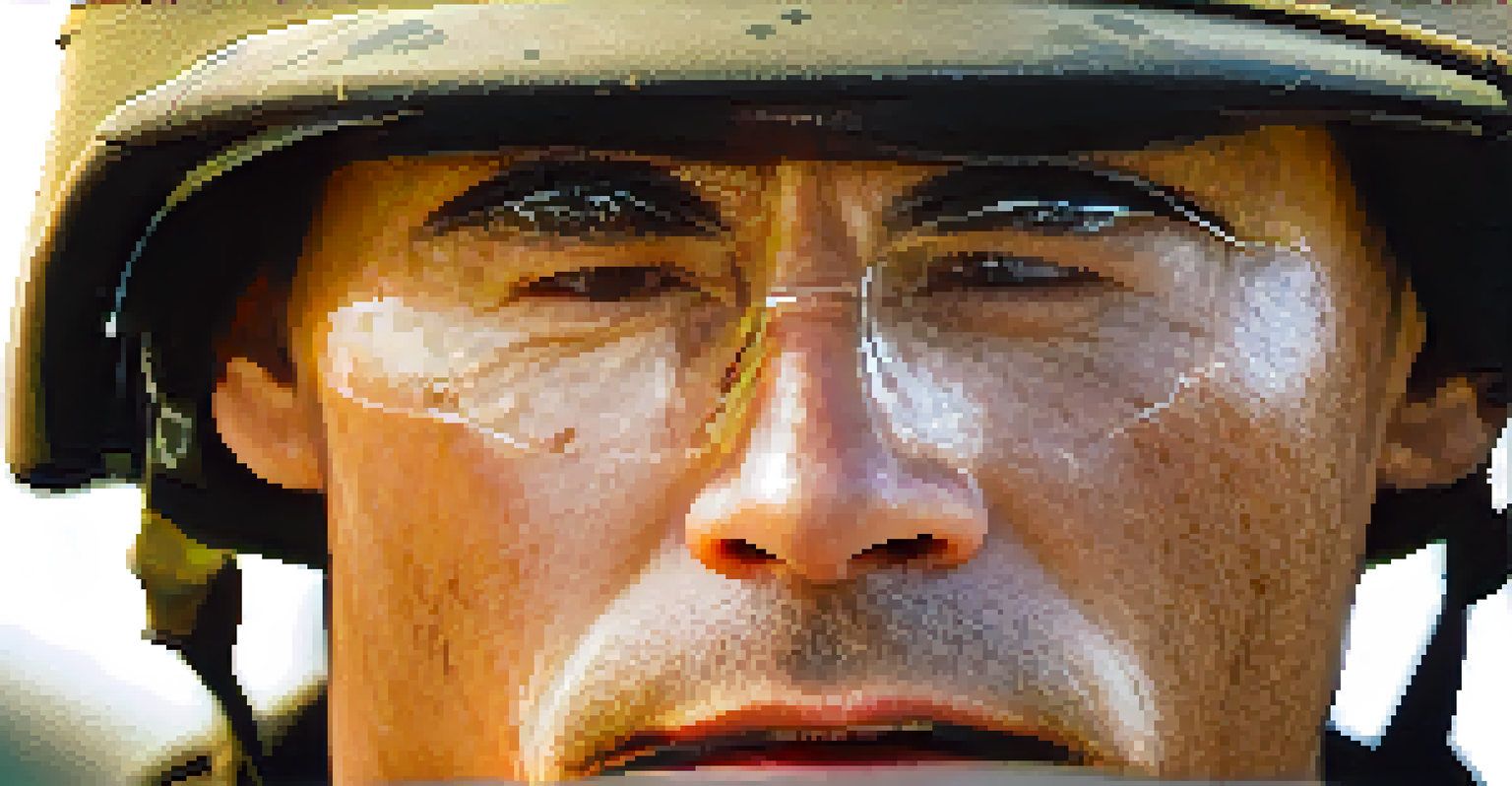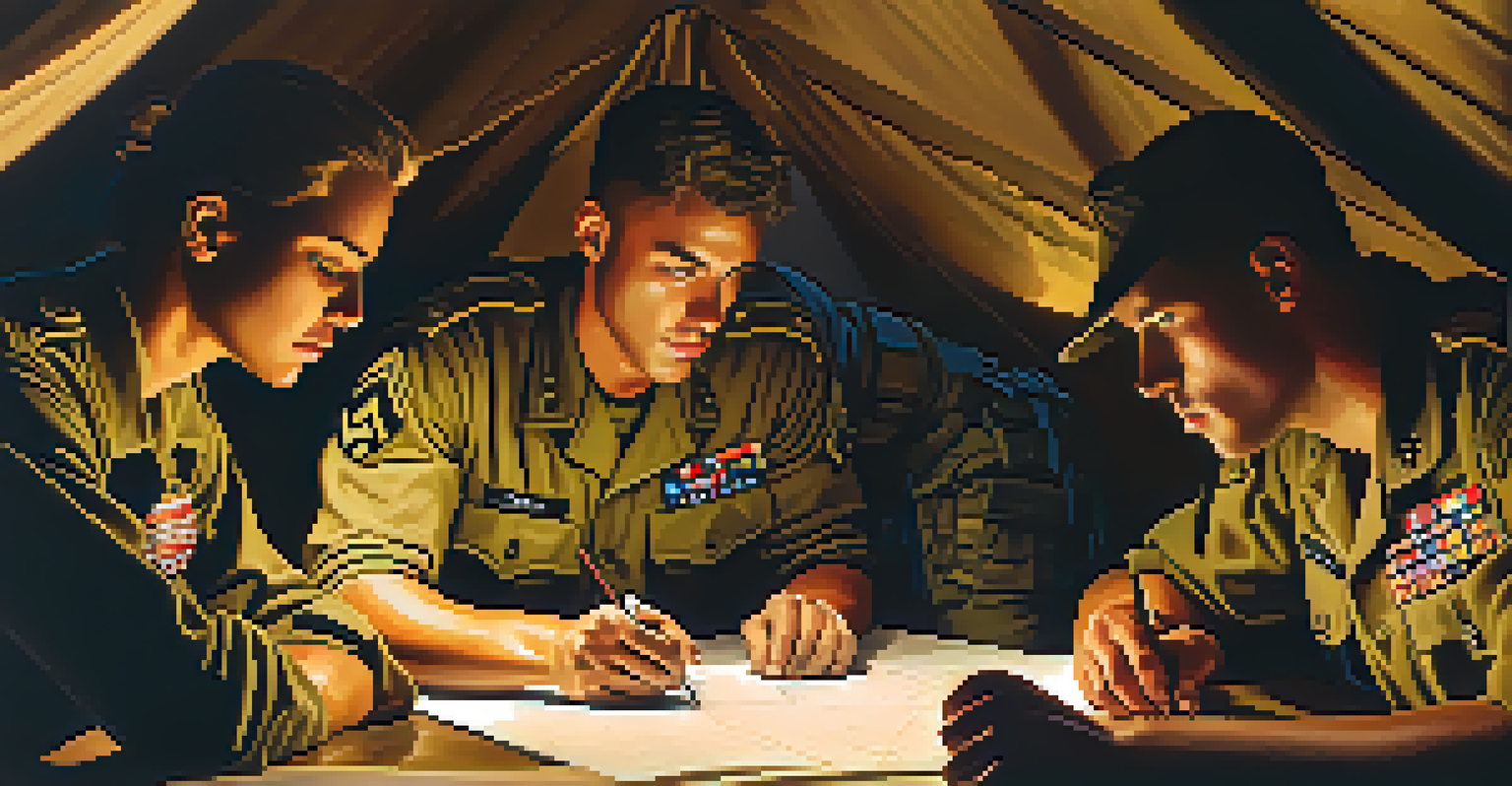Hollywood's Heroes: The Myth of the War Hero in Film

Defining the War Hero Archetype in Cinema
In Hollywood, the war hero is often portrayed as the ultimate symbol of bravery and sacrifice. These characters typically exhibit extraordinary courage, often overcoming insurmountable odds to protect their comrades and country. This archetype resonates deeply with audiences, as it taps into universal themes of heroism and honor that many admire.
The greatest glory in living lies not in never falling, but in rising every time we fall.
However, the portrayal of these heroes often glosses over the complexities of war and its psychological toll. Instead of showcasing the multifaceted nature of soldiers' experiences, films tend to simplify their narratives into clear-cut battles of good versus evil. This can lead to a distorted understanding of what it truly means to be a hero in a combat situation.
By analyzing this archetype, we can begin to understand not just the appeal of these characters, but also the potential harm in perpetuating unrealistic expectations of real-life soldiers. The archetype serves as a double-edged sword, inspiring admiration while simultaneously overlooking the nuanced realities of warfare.
Cinematic Techniques That Elevate War Heroes
Directors and writers employ various cinematic techniques to heighten the heroism of war characters. From sweeping camera angles that capture grand battle scenes to stirring musical scores that evoke emotion, these elements work together to create an unforgettable viewing experience. The use of close-ups on the hero's face during pivotal moments often serves to humanize them, making their struggles relatable.

Moreover, the pacing and editing of these films are meticulously crafted to build tension and excitement, making the audience feel as though they are part of the action. This immersive experience can make viewers more likely to idolize the hero, further amplifying their status in popular culture. It’s as if the audience is swept up in an adrenaline-fueled rush that glorifies the hero’s actions.
War Heroes: A Complex Portrayal
Films often simplify the experiences of war heroes, creating a romanticized image that overlooks the psychological toll of combat.
Yet, while these techniques enhance the excitement, they can also obscure the grim realities of war. The focus on adrenaline and spectacle can lead to a disconnect between the glorified heroics on screen and the true experiences of soldiers, who often face physical and emotional scars long after the battles are over.
The Evolution of the War Hero in Film History
The portrayal of war heroes has evolved significantly from the early days of cinema to modern films. In the 1930s and 1940s, heroes were often depicted as larger-than-life figures, embodying patriotism and valor during World War II. These films were primarily focused on boosting morale and emphasizing national pride, creating a clear-cut image of heroism.
War does not determine who is right — only who is left.
As time progressed, the narratives surrounding war heroes began to shift. The Vietnam War brought a more complex portrayal of soldiers, highlighting the moral ambiguities and psychological struggles they faced. Films from this era often depicted war heroes as flawed individuals grappling with their actions, rather than solely as symbols of glory.
Today, the trend continues to evolve, with filmmakers exploring even deeper themes of trauma, sacrifice, and redemption. This shift reflects a growing understanding of the psychological impacts of war, encouraging audiences to empathize with the heroes on a more personal level. By bringing these complexities to light, filmmakers can challenge the traditional narrative surrounding war heroes.
The Gender Dynamics of War Heroes in Film
Traditionally, Hollywood has favored male characters as the primary war heroes, reinforcing a gender stereotype that positions men as brave warriors. Films often depict women in supporting roles, either as caregivers or romantic interests, sidelining their potential contributions as heroes. This limited representation can perpetuate harmful notions about gender and courage in a military context.
However, recent films have begun to challenge this norm, showcasing strong female protagonists who take on heroic roles in war settings. Characters like those in 'Wonder Woman' and 'A Private War' have brought attention to the bravery and resilience of women in combat. This shift not only adds depth but also offers a more inclusive perspective on heroism.
Evolving Gender Dynamics in Film
While male characters have traditionally dominated the war hero archetype, recent films are challenging this norm by showcasing strong female leads.
By diversifying the portrayal of war heroes, filmmakers can inspire a broader audience and encourage a more nuanced understanding of bravery. These stories highlight that heroism is not confined to one gender, allowing for a richer narrative that celebrates courage in all its forms.
The Impact of War Heroes on Public Perception
War heroes in films have a profound impact on public perception of military service and veterans. They often shape the way society views soldiers, creating a romanticized image that can overshadow the harsh realities of combat. This glorification can lead to a disconnect between the heroics portrayed on screen and the actual experiences of veterans returning home.
Moreover, the way war heroes are celebrated in films can influence how veterans are treated in society. A film that portrays soldiers as heroic figures may foster admiration and support, while a more critical narrative might provoke discomfort or misunderstanding. This dynamic underscores the responsibility filmmakers hold in shaping societal attitudes toward military service.
By recognizing the power of these portrayals, we can better understand the implications they have on veterans' reintegration into civilian life. It’s essential for audiences to engage critically with these films, reflecting on how they might affect perceptions of real-life heroes and the complexities of their experiences.
The Role of Historical Accuracy in War Films
While entertainment value is a priority in Hollywood, the accuracy of historical events in war films often takes a backseat. Filmmakers frequently prioritize narrative over factual representation, leading to portrayals that may misinform audiences about critical events. This can create a skewed understanding of history, particularly for younger viewers who may rely on films as educational resources.
For instance, movies that dramatize battles often simplify complex geopolitical situations, turning them into straightforward conflicts between heroes and villains. This can lead to a lack of critical engagement with the realities of war and its consequences. By glossing over intricacies, these films risk perpetuating myths about heroism and the nature of warfare.
Impact on Public Perception
The portrayal of war heroes in cinema shapes societal views on military service, influencing how veterans are perceived and treated in real life.
However, some filmmakers strive for greater authenticity, employing historians and veterans to ensure more accurate depictions. By doing so, they can create a more enriching viewing experience that honors the sacrifices of those who served. As audiences become more aware of these efforts, they may seek out films that balance entertainment with a commitment to historical truth.
The Future of War Heroes in Hollywood
As Hollywood continues to evolve, the portrayal of war heroes is likely to undergo further transformation. With the rise of streaming platforms and diverse storytelling voices, filmmakers are exploring new narratives that reflect a broader range of experiences. This shift may lead to a more nuanced understanding of heroism that includes the perspectives of those often left out of traditional narratives.
Moreover, the increasing focus on mental health and the psychological impacts of war suggests that future films may delve deeper into the emotional journeys of their characters. By addressing the complexities of trauma and recovery, filmmakers have the opportunity to create more relatable stories that resonate with audiences on a personal level.

Ultimately, the future of war heroes in Hollywood lies in a commitment to authenticity and diversity. By embracing a wider array of experiences and perspectives, filmmakers can create powerful narratives that honor the complexities of heroism, inspiring new generations to understand and appreciate the true meaning of courage.